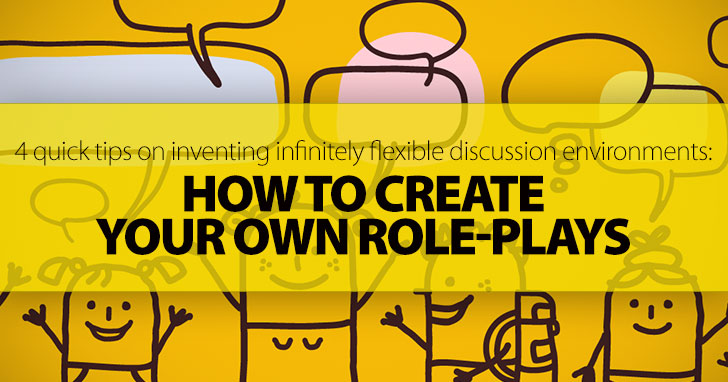Top 10 Role Plays For Your Speaking Class


They’ve learned the vocabulary and the structures, and can pass the tests, but now they find themselves vociferously arguing a point, or taking a key role in a dynamic discussion, surprised at their own confidence and fluency. The boost is tremendous; it could literally change the course of the student’s education, and lead to exciting possibilities.
Role-play allows a class to debate a sensitive or controversial point without the bruising emotional experience of expressing a minority opinion or putting their reputation on the line. Rather than dealing with genuine and weighty real-world issues, we can use imagination and a convincing ‘man-made’ environment to emulate reality, like in a movie or video game. Such environments are infinitely flexible, permitting customization and nuance which respond to our students’ beliefs, provoke debate in an unthreatening format, and invite everyone to participate equally.
There are no limits to how a role-play might operate. The students might be defending a policy, or trying to persuade their group to accept change. It could be a life or death decision. Or it could just be the advocating of a new technology they think would sell well. Perhaps they’re representing a badly treated jungle tribe, or a maligned CEO, reeling from the latest scandal. They could take the role of a historical figure, or a contemporary leader, or someone not yet born. Creating these environments has been one of the most enjoyable and productive aspects of my ESL career.
Inventing your own role-plays is time-consuming, and demands care and attention, but once created, you’ll have a superb platform for genuine and passionate student interaction. Students who might be shy of airing their own views, and therefore not likely to produce as much as we’d like, find themselves in a safe place, and with a role they can embody by actually maximizing their production. Learners who are used to a single point of view, or who are trained in black-and-white thinking, can find themselves challenged to embody the opposite view, and to engage with the nuances of those oh-so-important gray areas. The role-play itself becomes a valuable, shared experience which aids integration and unity within the class. I really can’t recommend this enough: try the steps below, and create your own role-play.

What interests them? What gets them talking? Listen for issues which come up repeatedly, or cause debate or disagreement. Tap into the students’ hobbies and backgrounds, the subjects they’re planning to study at college, or topics raised in movies they’ve recently seen.
Review what they already know and focus on one or two skills which either need review, or have yet to flourish. Consider recent language points – tenses, modals, conditionals, plurals, comparisons, measure expressions, modifiers, etc – and assess which of these might both benefit from review and might usefully be practiced in a role-play environment. Here are some possibilities, with ‘meta-questions’ to help you choose a particular narrative or role-play context:
Grammar points might include:
Grammar points will include:
Grammar points might include:
Depending on the role-play context, students could take a character and express their point of view. Examples could include:
Examples:
One of my favorite role-play tasks was to create four fictional cities, each with different characteristics, and have the students decide which one would be most suitable to hold an Olympic Games. One had a crime problem, another had a substandard transport network, another had problems with protestors from a local ethnic group, etc. Once the situation was analyzed, groups represented each city in a bid to persuade the IOC (their teacher) to vote for them, and to discredit the other cities.
Another favorite was a complex negotiation between two countries who are on the brink of war. Long-term mistrust and continual skirmishing is (hopefully!) put aside while issues such as sharing resources, allowing access to a holy site, forming a non-aggression treaty and arranging a technology exchange are discussed. The final package was a nuanced mix of give and take, spiced up by the two groups having deliberately lied to each other on crucial points. It never fails to arouse passions and lead to huge amounts of language production.
I hope that this helps you to try creating some of your own role-plays, and to enjoyably guiding your students to greater production and confidence!